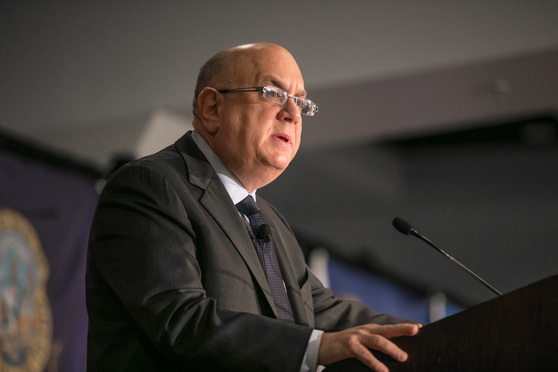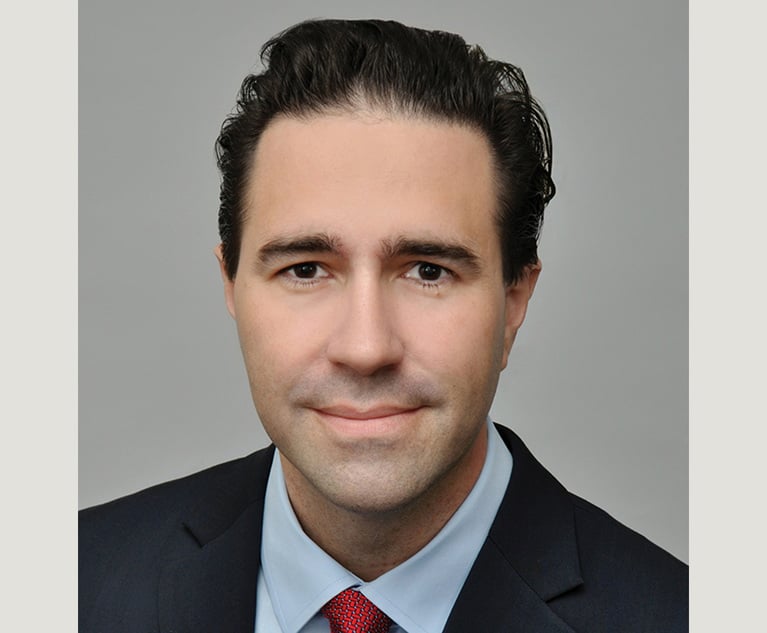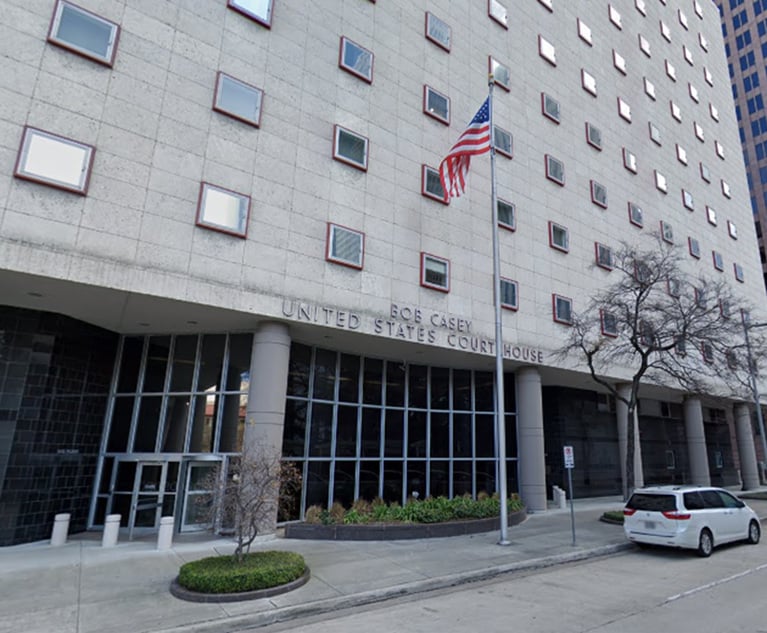Do These Oregon Cases Signal Doom for Lawyers Looking to Ban State Bar Dues?
“We'll continue to pursue this case and our cases on this issue in other courts until the Supreme Court rules that lawyers have the right to decide for themselves whether to fund bar association politics," said Jacob Huebert, senior attorney at the Goldwater Institute in Phoenix.
May 28, 2019 at 03:15 PM
4 minute read
 U.S. District Judge Michael Simon of the U.S. District Court for the District of Oregon. Photo: Jason Doiy/The Recorder
U.S. District Judge Michael Simon of the U.S. District Court for the District of Oregon. Photo: Jason Doiy/The Recorder
If ongoing litigation in Texas, North Dakota and Oklahoma follows a similar pathway as two recently dismissed cases that challenged the constitutionality of the Oregon State Bar, then it would be good news for mandatory bar associations.
In Oregon, Oklahoma, North Dakota and Texas, attorneys sued their state bars, bar officers and directors, alleging that mandatory bar membership and compulsory dues violate the U.S. Constitution's First and Fourteenth Amendments.
The plaintiffs have claimed the bar associations were spending dues on alleged political and ideological activities, without their consent, which they argued is unconstitutional under a 2018 U.S. Supreme Court case, Janus v. AFSCME.
But bar associations have countered that they have sovereign immunity, that Janus doesn't apply to the bar, and that all of their activities are constitutional under previous U.S. Supreme Court case law that's specific to bar associations.
Their arguments worked in Oregon.
U.S. District Judge Michael H. Simon on May 24 adopted a magistrate judge's findings and dismissed the cases Gruber v. Oregon State Bar and Crowe v. Oregon State Bar, finding that the bar has sovereign immunity, and that the plaintiffs have no cognizable constitutional claims.
“As the law currently stands with respect to integrated bars, compulsory fees and mandatory membership do not violate the First and Fourteenth Amendments,” said the findings and recommendation by U.S. Magistrate Judge Jolie Russo. “This is true even if the bar engages in political speech so long as the speech is germane to regulating the legal profession and improving the quality of legal services.”
Russo found the bar has sovereign immunity and although the individual defendants wouldn't enjoy the same immunity, the court also determined the Oregon bar operates constitutionally under bar-specific U.S. Supreme Court precedent in two cases—Lathrop v. Donohue and Keller v. State Bar of California. Russo noted that only the Supreme Court could overrule its own decisions.
Oregon bar spokeswoman Kateri Walsh wrote in an email that the bar believes the court made the correct ruling.
“The legal profession has unique obligations to the public, which are best met through the unified bar model with its rigorous focus on both public protection and support for a strong and fully accessible justice system,” she said.
But Jacob Huebert, senior attorney at the Goldwater Institute in Phoenix, who represented the plaintiffs Crowe, said he's disappointed and disagrees with the ruling, which the plaintiffs plan to appeal to the U.S. Court of Appeals for the Ninth Circuit.
“We hope that the United States Supreme Court will resolve this issue for the entire country, and if it followed the principles stated in Janus v. AFSCME, then the forced funding of these mandatory bar associations should end nationwide,” Huebert said. “We'll continue to pursue this case and our cases on this issue in other courts until the Supreme Court rules that lawyers have the right to decide for themselves whether to fund bar association politics.”
Mike Spencer, a solo practitioner in Klamath Falls, Oregon, who represented the plaintiffs in Gruber, said his clients also plan to appeal. He's closely watching Fleck v. Wetch, the North Dakota case, because there's an oral argument scheduled June 13 before the U.S. Court of Appeals for the Eighth Circuit.
Spencer said, “Maybe that one will get to the Supreme Court and give us an answer.”
Read the findings and recommendation.
This content has been archived. It is available through our partners, LexisNexis® and Bloomberg Law.
To view this content, please continue to their sites.
Not a Lexis Subscriber?
Subscribe Now
Not a Bloomberg Law Subscriber?
Subscribe Now
NOT FOR REPRINT
© 2025 ALM Global, LLC, All Rights Reserved. Request academic re-use from www.copyright.com. All other uses, submit a request to [email protected]. For more information visit Asset & Logo Licensing.
You Might Like
View All
Houston-Based Law Firm Overcomes Defamation Suit for Website Warning
3 minute read
Houston Law Firm Files $250K Breach of Contract Suit Against 2 Former Lawyers
3 minute read

Texas Bankruptcy Judge Withdraws Ethics Complaint Against Jackson Walker
2 minute readTrending Stories
- 1Six Benefits of Taking an Opposing Medical Expert’s Deposition
- 2Ex-Prosecutor’s Trial Ends as Judge Throws Out Her Felony Indictment in Ahmaud Arbery Death Case
- 3Conversation Catalyst: Transforming Professional Advancement Through Strategic Dialogue
- 4Trump Taps McKinsey CLO Pierre Gentin for Commerce Department GC
- 5Critical Mass With Law.com's Amanda Bronstad: 700+ Residents Near Ohio Derailment File New Suit, Is the FAA to Blame for Last Month's Air Disasters?
Who Got The Work
J. Brugh Lower of Gibbons has entered an appearance for industrial equipment supplier Devco Corporation in a pending trademark infringement lawsuit. The suit, accusing the defendant of selling knock-off Graco products, was filed Dec. 18 in New Jersey District Court by Rivkin Radler on behalf of Graco Inc. and Graco Minnesota. The case, assigned to U.S. District Judge Zahid N. Quraishi, is 3:24-cv-11294, Graco Inc. et al v. Devco Corporation.
Who Got The Work
Rebecca Maller-Stein and Kent A. Yalowitz of Arnold & Porter Kaye Scholer have entered their appearances for Hanaco Venture Capital and its executives, Lior Prosor and David Frankel, in a pending securities lawsuit. The action, filed on Dec. 24 in New York Southern District Court by Zell, Aron & Co. on behalf of Goldeneye Advisors, accuses the defendants of negligently and fraudulently managing the plaintiff's $1 million investment. The case, assigned to U.S. District Judge Vernon S. Broderick, is 1:24-cv-09918, Goldeneye Advisors, LLC v. Hanaco Venture Capital, Ltd. et al.
Who Got The Work
Attorneys from A&O Shearman has stepped in as defense counsel for Toronto-Dominion Bank and other defendants in a pending securities class action. The suit, filed Dec. 11 in New York Southern District Court by Bleichmar Fonti & Auld, accuses the defendants of concealing the bank's 'pervasive' deficiencies in regards to its compliance with the Bank Secrecy Act and the quality of its anti-money laundering controls. The case, assigned to U.S. District Judge Arun Subramanian, is 1:24-cv-09445, Gonzalez v. The Toronto-Dominion Bank et al.
Who Got The Work
Crown Castle International, a Pennsylvania company providing shared communications infrastructure, has turned to Luke D. Wolf of Gordon Rees Scully Mansukhani to fend off a pending breach-of-contract lawsuit. The court action, filed Nov. 25 in Michigan Eastern District Court by Hooper Hathaway PC on behalf of The Town Residences LLC, accuses Crown Castle of failing to transfer approximately $30,000 in utility payments from T-Mobile in breach of a roof-top lease and assignment agreement. The case, assigned to U.S. District Judge Susan K. Declercq, is 2:24-cv-13131, The Town Residences LLC v. T-Mobile US, Inc. et al.
Who Got The Work
Wilfred P. Coronato and Daniel M. Schwartz of McCarter & English have stepped in as defense counsel to Electrolux Home Products Inc. in a pending product liability lawsuit. The court action, filed Nov. 26 in New York Eastern District Court by Poulos Lopiccolo PC and Nagel Rice LLP on behalf of David Stern, alleges that the defendant's refrigerators’ drawers and shelving repeatedly break and fall apart within months after purchase. The case, assigned to U.S. District Judge Joan M. Azrack, is 2:24-cv-08204, Stern v. Electrolux Home Products, Inc.
Featured Firms
Law Offices of Gary Martin Hays & Associates, P.C.
(470) 294-1674
Law Offices of Mark E. Salomone
(857) 444-6468
Smith & Hassler
(713) 739-1250






